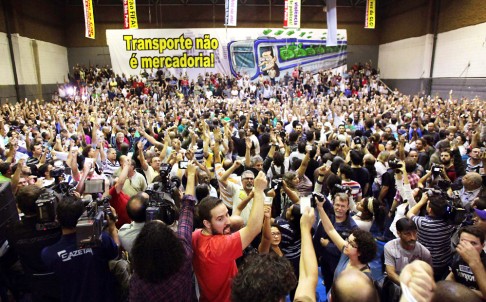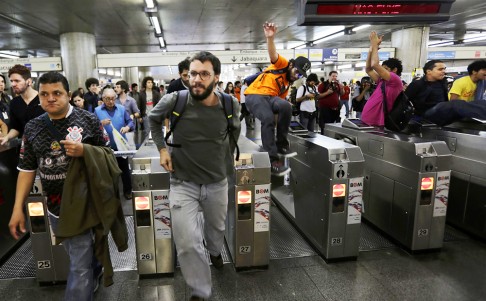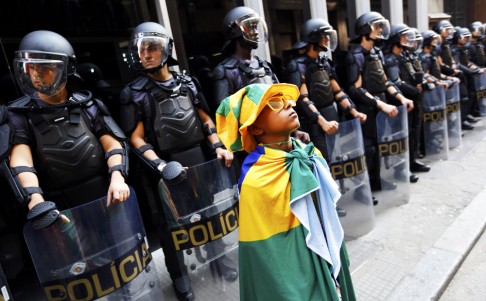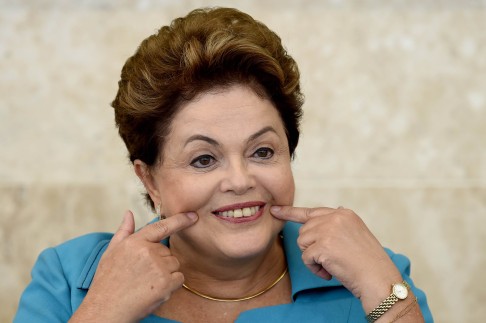Sao Paulo subway workers suspend strike ahead of World Cup
Union warns its members could still down tools again before the tournament kicks off on Thursday
PUBLISHED : Tuesday, 10 June, 2014, 9:53am
UPDATED : Tuesday, 10 June, 2014, 7:00pm
Agence France-Presse in Sao Paulo

Metro workers vote to suspend their five-day strike until June 11, the day before the start of the 2014 World Cup. Photo: Reuters
Subway workers in Sao Paulo suspended on Monday a strike that had caused traffic chaos in the World Cup host city but warned the work-stoppage could resume when the tournament kicks off.
The union’s vote will come as a relief to commuters in the business hub of 20 million people as the city prepares to host the opening ceremony and the Brazil-Croatia game on Thursday.
After preparations marred by delays, overspending and protests, officials want to avoid traffic mayhem when the world’s eyes will be on Brazil for the next month.
Around a billion people worldwide are expected to watch the opening game on television, while UN Secretary general Ban Ki-moon and 12 heads of state and government will be in the stadium, which workers are rushing to finish in time.

Demonstrators jump over the turnstiles without paying subway fare in support of a strike by metro workers in Sao Paulo on Monday. Photo: Reuters
The union decided to halt the five-day-old walkout after transport authorities fired 42 employees for “just cause” over actions they took during the strike, which was ruled illegal by a court.
“Whether we put down tools or not will depend on the re-hiring of the 42 workers,” union president Altino Melo dos Prazeres said after a heated debate among workers.
“I’m a fan of Neymar and I will support the Cup,” he said. “Nobody here wants to mess up the Cup. But we see that there’s money for the tournament but not for the workers.”
Subway workers walked out last week to demand a pay raise in the latest wave of protests and strikes that have swept Brazil ahead of the World Cup and October elections.
The union wants a 12.2 per cent pay hike, but the government is offering only 8.7 per cent.
Early on Monday, some 150 demonstrators supporting the strikers were dispersed by riot police using tear gas after the protesters set rubbish bags on fire outside a metro station.
But the other demonstrators regrouped with chants of “there won’t be a Cup, there will be a strike!” and they were joined by 1,000 others as they marched downtown.
The five-line subway has been operating partially, causing headaches to 4.5 million passengers and forcing people to find alternative routes to the Corinthians Arena that will host the opening ceremony and match.
World Cup teams, meanwhile, continued arriving in Brazil, with reigning champions Spain touching down on Sunday night.
France, Cameroon, Argentina, Uruguay, Ecuador, Costa Rica, Honduras and the United States also arrived on Monday the latter three in Sao Paulo.
Rising inflation and a sluggish economy have tarnished the World Cup glow in Brazil, fuelling the anger of strikers and protesters who say the US$11-billion budget would have been better spent on education, health and transport.
Work on the 12 host stadiums has also been overshadowed by delays and accidents that have killed eight workers, including three at Corinthians.

A young soccer fan stands in front of a police line during the fifth day of metro worker's protest in Sao Paulo on Monday. Photo: Reuters
The new 61,600-capacity Corinthians Arena in Sao Paulo has become a symbol of the problems besetting the tournament.
At the weekend, workers were still racing to finish the over-budget and chronically delayed stadium.
President Dilma Rousseff, who is seeking reelection in October, insists the money spent on the tournament will leave a lasting legacy of modernised transport infrastructure.
But many of the promised projects have been shelved, adding to protesters’ anger.
Last year during the Confederations Cup, a World Cup dress rehearsal, more than a million people flooded the streets, some destroying property and clashing with police.
Recent protests have been smaller, but activists are vowing to revive last year’s “Tropical Spring” during the World Cup.
Rousseff meanwhile, will not attend Tuesday’s formal opening of the Fifa Congress, a meeting of the world football body’s 209 members, the Sao Paulo newspaper O Estado de Sao Paulo reported on Monday.
The head of state or head of government traditionally addresses the meeting.
The newspaper cited unnamed sources at the presidential palaces.
Fifa has criticised Brazil over the last few years for delays in building World Cup stadiums and related road and airport projects.
The paper said Sport Minister Aldo Rebelo would replace Rousseff who has promised – despite poor preparations – that this will be the “Cup of Cups.”

Dilma Rousseff insists the money spent on the tournament will leave a lasting legacy of modernised transport infrastructure. Photo: AFP
In another sign of the disquiet surrounding the tournament, neither Rousseff nor Fifa President Sepp Blatter will speak at Thursday’s opening match. They were jeered at the opening of the Confederations Cup a year ago.
Fifa’s general secretary Jerome Valcke angered Brazilians two years ago when he said the country needed a “kick in the backside” to get construction moving.
About US$4 billion of Brazil’s World Cup budget has been allocated to build or renovate 12 stadiums. Four of those are expected to become white elephants.
The lavish spending became a target of protests at the Confederations Cup – a warm-up for the World Cup. Daily demonstrations were met with tear gas and rubber bullets, and tear gas wafted into the Maracana stadium in Rio during the final between Brazil and defending World Cup champions Spain.
Brazil is deploying almost 200,000 soldiers and police around the country this time, bracing for more demonstrations with many citizens lukewarm about the tournament, and similarly apprehensive about spending on the 2016 Olympic in Rio de Janeiro.
Spending there has reached US$17 billion – a mix of public and private money – with the costs sure to rise.
Rousseff is still the favourite for re-lection, but her polls numbers are falling. A recent Pew survey found 61 per cent of Brazilians opposed to holding the World Cup.
Additional reporting by Associated Press
